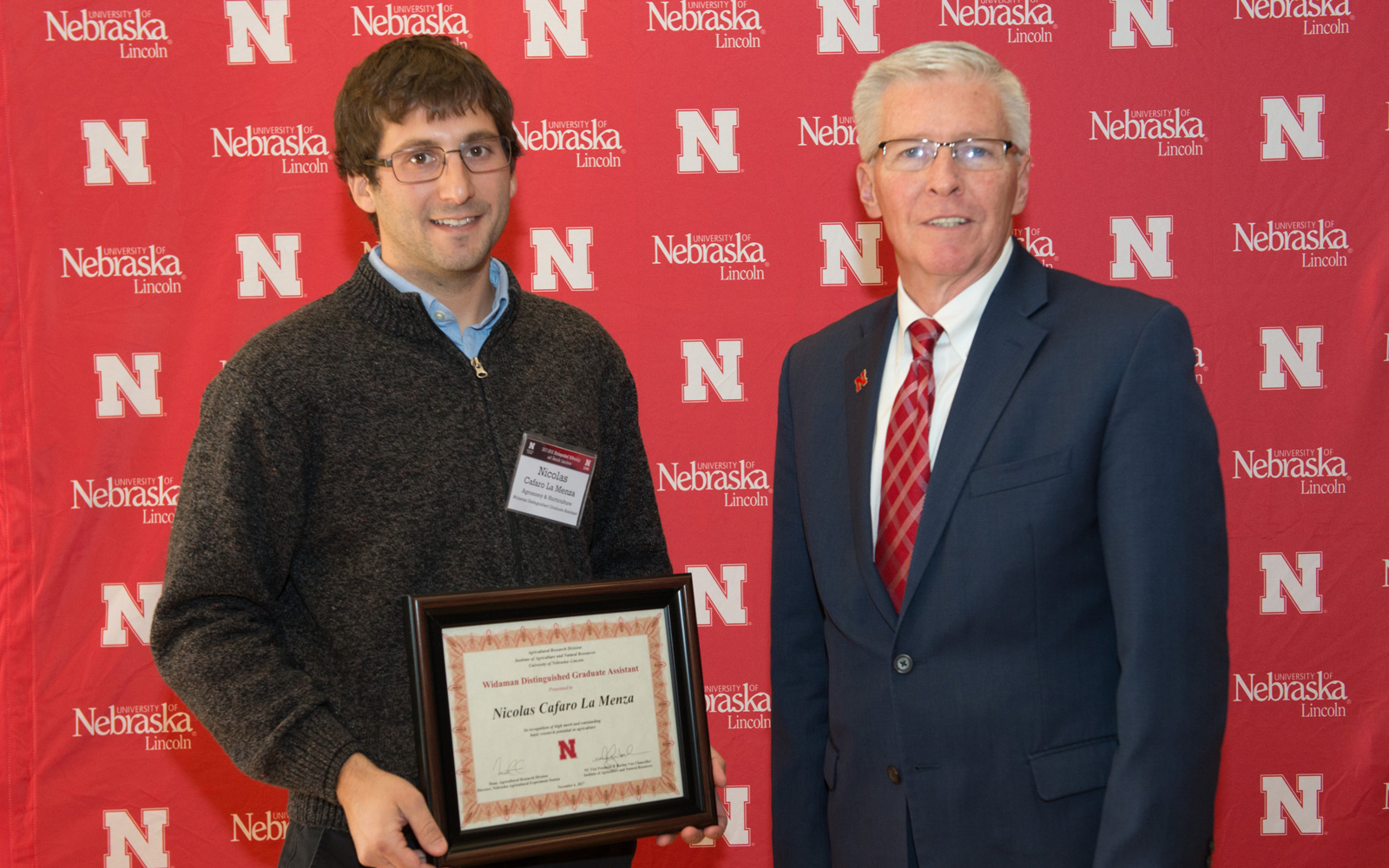
Eight Department of Agronomy and Horticulture graduate students were honored with fellowships and awards by the Agricultural Research Division and the College of Agricultural Sciences and Natural Resources at the Distinguished Fellowships and Awards Luncheon on Nov. 6.
Those honored include Madhav Bhatta, Manbir Kaur Rakkar, Thomas Butts, Nicolas Cafaro la Menza, Elnazsadat Hosseiniaghdam, Nikita Gambhir, Parminder Chahal and Salvador Ramirez.
Bhatta was awarded the Hardin Distinguished Graduate Fellowship. This fellowship supports research in plant physiology with particular emphasis on genetic mechanisms influencing plant responses to stress conditions.
Bhatta’s research focuses on broadening the genetic base of wheat from the primary hexaploid synthetic wheat developed by CIMMYT and Kyoto University, Japan. The main objective of this study is to identify genes/genomic regions controlling resistance to biotic and abiotic stresses in primary synthetic hexaploid wheat using GBS derived SNP markers. Bhatta is a doctoral student advised by P. Stephen Baenziger
Rakkar and Butts were awarded the Shear-Miles Fellowship. This award is given to students with high scholastic merit and research potential in basic agriculture.
Rakkar’s research involves evaluating the impact of corn residue grazing and baling on soils and crop yields. She has been testing the physical, chemical, microbiological and erosion aspect of soil under different residue management scenarios across Nebraska’s precipitation gradient since 2015. She will then integrate the measured soil properties and determine the impact of residue grazing and baling on soil ecosystem services. These findings will be helpful for farmers as well as the scientific community in developing a sustainable integrated crop-livestock system. Rakkar is a doctoral student advised by Humberto Blanco.
Butts is currently researching the influence of pulse-width modulation sprayers on droplet spectrum, spray application parameters and herbicide efficacy. His research aims to provide best use practices for pulse-width modulation sprayers to farmers and applicators, as well as produce pest management recommendations that can assist in the implementation of site-specific strategies. Butts is a doctoral student advised by Greg Kruger at the Pesticide Application Technology Laboratory in North Platte, Nebraska.
Cafaro la Menza and Hosseiniaghdam were awarded the Widaman Distinguished Graduate Assistant Award. This award is to fund scholarships or fellowships for graduate students conducting basic research in agriculture.
Cafaro la Menza, a doctoral student advised by Patricio Grassini, is working on a Nebraska Soybean Board grant project called 'Resource use efficiency in high-yield soybean'. The objective of this study is to quantify the solar radiation, nitrogen and water use efficiency of high-yield soybeans (>80 bu/ac) to help fine tune farmer management practices. Specifically, he is working with a novel fertilization protocol to assess nitrogen limitation on soybeans. Nitrogen limitation is more likely to happen in high yield (90 bu/ac) soybeans. Removing this N limitation will allow an increased yield and an increase in the seed protein concentration.
Hosseiniaghdam’s research involves studying the effect of different stocking densities on nutrient cycling and model simulation of meadows grazed at high and low stocking density. She is a doctoral student advised by Haishun Yang and Martha Mamo.
Gambhir’s research is on Sclerontinia Sclerotiorum, a common white mold which causes disease in more than 450 plant species. When chemicals are used to control the mold, the mold becomes resistant and is no longer killed. Gambhir is working on why this happens, what kind of changes occur in the DNA, is it the same change for different chemicals and to figure out how to prevent this from happening. She is a doctoral student advised by Sydney Everhart.
Chahal was awarded the Farmers National Company Fellowship in Agriculture. His research involves evaluating the effect of water stress on growth and seed production and developing herbicide programs for the control of multiple herbicide-resistant Palmer amaranth in Nebraska corn. He is also exploring the mechanism of herbicide resistance and determining the physiological basis of synergism with tank-mixed applications of atrazine and mesotrione on the control of resistant Palmer amaranth. Chahal is a doctoral student advised by Amit Jhala.
Ramirez was awarded the North American Colleges and Teachers of Agriculture Graduate Student Teaching Award of Merit Certificate. This award recognizes graduate students for their accomplishments as a teacher.
Ramirez assists in teaching Science and Decision-Making for a Complex World (SCIL 101) taught by Jenny Dauer, Invasive Species (AGRO 426) taught by John Lindquist, Soil Nutrient Relationships (AGRO 366) taught by Martha Mamo, and co-instructs Soil Resources (AGRO 153) with Martha Mamo and Michael Sindelar, agronomy graduate student.
Ramirez is a Doctor of Plant Health student advised by Gary Hien. He is also an agronomy graduate student working with Rhae Drijber and Virginia Jin to measure soil microbial biomass and characterize soil microbial community structure in production agriculture systems.
More details at: https://agronomy.unl.edu/news/graduate-students-earn-fellowships-and-awards-0